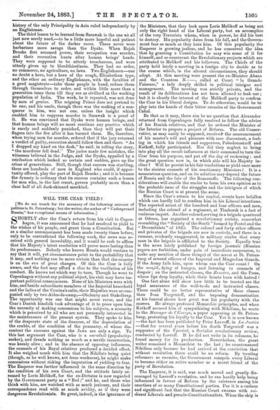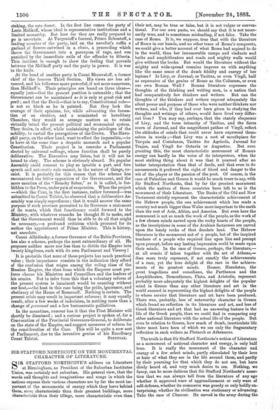WILL THE CZAR YIELD?
[We do not vouch for the accuracy of the following account of politics in St. Petersburg ; but the writer, the author of " Underground Russia," has exceptional means of information.]
SHORTLY after the Czar's return from his visit to Copen- hagen, it was announced that he had resolved to yield to the wishes of hie people, and grant them a Constitution. But as a similar announcement has been made twenty times before, only to be contradicted the following week, the news was re- ceived with general incredulity, and it would be rash to affirm that his Majesty's latest resolution will prove more lasting than its predecessors. Nobody who knows Russia would venture to say that it will, yet circumstances point to the probability that it may, and nothing can be more certain than that the country is on the eve of great changes. Of this the Czar is fully aware, and the fact may afford a clue to the vacillation of his conduct. He knows not which way to turn. Though he went to Copenhagen without any political object, his visit may have im- portant political consequences. None of his Ministers were with him, and beside subordinate members of the Imperial household and the ladies of the Czarina's suite, their Majesties were accom- panied only by two Aides-de-camp,—Obelenvy and Stakelberg. The opportunity was one that might never recur, and the Czar's Danish kinsfolk took advantage of it to press upon him the necessity of making concessions to his subjects, a necessity which is perceived by all who are not personally interested in the maintenance of the present system. They spoke to him of the desperate state of the finances, of the depreciation of the rouble, of the condition of the peasantry, of whose dis- content the excesses against the Jews are only a sign. To this last argument the Czar, who is a narodnik (popularity- seeker), and dreads nothing so much as a servile insurrection, was keenly alive ; and in the absence of opposing influences, the counsels of his Royal relatives produced a decided effect. It also weighed much with him that the Nihilists being quiet (though, as he well knows, not from weakness), he might make concessions without risking the imputation of yielding to fear. The Emperor was further influenced in the same direction by the condition of his own Court, and the attitude lately as- sumed by Loris Melikoff, for the ex-Dictator is now regarded by the Government party as a "Red ;" and he, and those who think with him, are watched with as much jealousy, and their correspondence read with as much avidity, as if they were dangerous Revolutionists. So great, indeed, is the ignorance of
the Ministers, that they look upon Loris Melikoff as being not only the right hand of the Liberal party, but an accomplice of the very Terrorists whom, when in power, he did his best to destroy. His popularity dates from his fall, and the Govern- ment fear as much as they hate him. Of this popularity the Emperor is growing jealous, and he has conceived the idea. that by granting a Constitution he may win some of it for himself, and so counteract the Revolutionary projects which are attributed to Melikoff and his followers. The Chiefs of the party held lately a meeting in a foreign city to decide, as to the course which, in the altered circumstances, they should adopt. At this meeting were present the ex-Minister Abaza and the Countess N—, called at Court " la Grande Faiseuse," a lady deeply skilled in political intrigue and management. The meeting was strictly private, and the result of its deliberations has not been allowed to leak wit; but it is clearly the interest of the Melikoff party to confirm the Czar in his liberal designs. To do otherwise, would be to play into the hands of their bitter enemies of the Government Cabal.
Be that as it may, there can be no question that Alexander returned from Copenhagen fully resolved to follow the advice of his Danish relatives, and that he ordered the Minister of the Interior to prepare a project of Reform. The old Conser- vative, as may easily be supposed, received the announcement of his master's will and pleasure with sore discontent, a feel- ing in mhich his friends and supporters, Pobedonostzeff and Katkoff, fully' participated. Nor did they neglect to bring into play all the occult influences at their command to turn the Czar from his purpose, and put off the day of reckoning ; and the great question now is, to which side will his Majesty in- cline? Will he persist in his fair resolutions or yield once more to the sinister counsels of his reactionary Ministers ? . It is a momentous question, and on its solution may depend the future of Russia and the fate of the Romanoffs. The following con- siderations will enable the reader to form his own opinion as to the probable issue of the struggles and the intrigues of which the Russian Court is at present the scene.
Since the Czar's return to his capital, events have befallen which can hardly fail to confirm him in his Liberal intentions.
The reported arrest of the hundred and four officers and men, including the colonel of a regiment, at Timbersk is a fact of ominous import. Another colonel, serving in a brigade quartered at Odessa, has organised a revolutionary society, somewhat resembling the "Society of the South" formed by Pastel and the " Decembrists "of 1825. The colonel and forty other officers and privates of the brigade are now in custody, and there is a rumour, evidently exaggerated, in military circles that every man in the brigade is affiliated to the Society. Equally true is the news lately published by foreign journals (Russian papers are forbidden, under pain of immediate suspension, to make any mention of these things) of the arrest at St. Peters- burg of several officers of the Imperial and Mingrelian Guards. If the Army fails him, upon whom can the Czar count ? On the moujik, dying of hunger, and listening to counsels of despair ; on the instructed classes, the Zemsteo, and the Press, whose lips drop loyalty, while their hearts burn with hatred ?
One fact alone will show how little to be trusted are the loyal assurances of the well-to-do and instructed classes. There could be no better representative of these classes than Ivan Turgenieff, and the imposing demonstration at his funeral shows how great was his popularity with the masses. He always professed Monarchic principles, and when Katkoff accused him of sympathising with Nihilism, he wrote to the Messager de l'Eurcpe, a paper appearing at St. Peters- burg, protesting his loyalty to the Czar. Yet it is now known —the fact has been published by Peter Lavreff, in La Justice —that for several years before his death Turgenieff was a supporter of the Vperiod, a Socialist revolutionary review, conducted by Lavroff. If he did not write in its columns, he found money for its production. Nevertheless, the great writer remained a Monarchist to the last ; he countenanced Nihilism only because he had arrived at the conviction that without revolution there could be no reform. By treating reformers as enemies, the Government compels every Liberal to become either an active member or a secret friend of the party of Revolution.
The Emperor, it is said, was much moved and greatly dis- couraged by Lavroff's revelation, and he can hardly help being influenced in favour of Reform by the existence among his courtiers of so many Constitutional parties. For it is a curious and significant fact that the Russian Court swarms with sui- disant Liberals and pseudo-Constitutionalists. When the ship is sinking, the rats desert. In the first line comes the party of Loris Melikoff, whose ideal is representative institutions and a limited monarchy. But how far they are really prepared to go is uncertain. At Turgenieff's funeral, Prince Bebontoff, a leading member of the -party, laid on the novelist's coffin a garland of flowers entwined in a chain, a proceeding which threw the Government into a paroxysm of rage, and was punished by the immediate exile of the offender to Siberia. This incident is enough to show the feeling that prevails between the Melikoff party and the party in power. It is war to the knife.
At the head of another party is Count Shouvaloff, a former chief of the famous Third Section. His views are less ad- vanced, and his followers more powerful, if not more numerous, than Melikoff's. Their principles are based on three ideas— equally just—that the present position is untenable ; that the Government can be maintained as it is only at great risk and peril ; and that the Devil—that is to say, Constitutional rule—
is not so black as he is painted. But they lack the courage of their opinions, for, while advocating the forma- tion of an elective, and a nominated or hereditary Chamber, they would so arrange matters as to retain virtually intact the present political and economical system. They desire, in effect, while maintaining the privileges of the nobility, to curtail the prerogatives of the Crown. The Slavo- phil party, on the other hand, want to effect the impossible,—to to have at the same time a despotic monarch and a popular Constitution. Their project is to convoke a Parliament elected by universal suffrage, whose function shall be purely deliberative. The Executive may listen, but it will not be bound to obey. The scheme is obviously absurd. No popular Assembly could consent to play so ignoble a part, and free speech and autocratic rule cannot, in the nature of things, co- exist. It is probably for this reason that the scheme has encountered the bitter opposition of the Government, and the mere mention of the " Zemsky Sobor," as it is called, is for- bidden to the Press, under pain of suspension. When the project —which the Czar, in the first instance, rather favoured—was submitted to Count Tolstoi, he observed that a deliberative As- sembly was simply superfluous ; that it would answer the same purpose if each province presented to its Governor a statement of its wants, which that functionary could forward to the Ministry, with whatever remarks he thought fit to make, and that the Government would thus be able to do all that might be necessary,—a profound criticism which procured for its author the appointment of Prime Minister. This is history, not anecdote.
Count Albidinsky, a former Governor of the Baltic Provinces, has also a scheme, perhaps the most extraordinary of all. He proposes neither more nor less than to divide the Empire into twenty kingdoms, each with its own Parliament and Viceroy!
It is probable that none of these projects has much practical value ; their importance consists in the indication they afford of the confusion that reigns among the ruling dim of the Russian Empire, the class from which the Emperor must per- force choose his Ministers and Councillors and the leaders of his armies. But to infer from this that a voluntary reform of the present system is imminent would be counting without our host,—the host in this case being the pride, ignorance, and obstinacy of the House of Romanoff. Nothing is certain. The present crisis may result in important reforms ; it may equally result,- after a few weeks of indecision, in nothing more than a change of personnel and a few bureaucratic palliatives.
In the meantime, rumour has it that the First Minister will shortly be dismissed ; and a curious project is spoken of, for a Convocation of the Provincial Governors-General, to deliberate on the state of the Empire, and suggest measures of reform for the consideration of the Czar. This will be quite a new sort of Parliament, due to the inventive genius of his Excellency







































 Previous page
Previous page